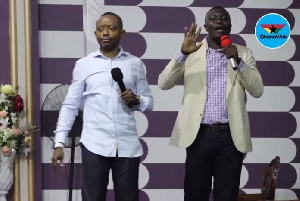Angry Muslim youth have attacked a church in Ghana's capital after its pastor predicted the possible death of the country's chief imam in 2019.
An organ, windows and chairs were damaged after the youth stormed Rev Isaac Owusu-Bempah's church in Accra.
Chief Imam Nuhu Sharabutu condemned the attack.
Self-styled Christian prophets have a huge following in Africa, and often predict major events, including the deaths of leading public figures.
In 2016, one of Africa's most popular preachers, Nigerian TB Joshua, predicted during a church service that Hillary Clinton would defeat Donald Trump in the US presidential election.
Critics poked fun at him after Mr Trump won. The prophecy was later deleted from his Facebook page.
In a sermon on 31st December, Rev Owusu-Bempah made 18 prophecies for 2019, including the death of either Imam Sharabutu or Ghana's Muslim Vice-President Mahamudu Bawumia.
Some Muslim youth asked the pastor to apologise to Imam Sharabutu, but he did not do so.
'Forgive the pastor'
Armed with machetes, the group stormed a church of the pastor's Glorious Word and Power Ministry on Wednesday.
The group streamed the attack live on Facebook, damaging property and razing to the ground a billboard with Rev Owusu-Bempah's image.
Imam Sharabutu appealed for calm, saying those incensed by the prophecy should forgive the pastor, who is one of the most charismatic church leaders in Ghana.
Ghana is a mainly Christian country, with no history of religious conflict.
In its reaction to the attack, the Glorious Word and Power Ministry said: "Christians, let's be strong and pray for the church."
Why pastors make prophecies
Like in other parts of Africa, churches have become big business in Ghana and one of the ways preachers fill their church auditoriums is by making doomsday prophecies.
Although heavily criticised by some Ghanaians, these preachers attract gullible followers - mostly uneducated people - who abandon work for week-long prayer meetings to avert their own death - a topic which features prominently in daily services.
Politicians, film stars and businessmen also go to the celebrity preachers for "spiritual protection" or to increase their fortunes.
When a predicted death fails to materialise, the preachers say their prayers helped save the person's life.
And when prominent people die, a barrage of videos and audio clips emerge from the self-styled prophets who allege the death was revealed to them by God.
Although most of the prophecies turn out to be false, they keep the pastors in the media spotlight and this enhances their chances of becoming celebrity preachers.
And they continue drawing huge crowds as more and more people hope for financial success or to be healed of illnesses which have badly affected their quality of life.
General News of Friday, 4 January 2019
Source: bbc.com
How BBC reported attack on Owusu-Bempah's church over 31st night prophecy
Entertainment












